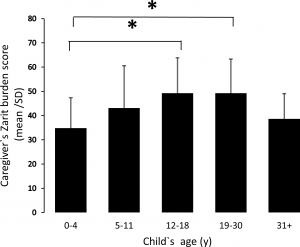High levels of caregiver burden measured in Prader-Willi syndrome
MARCH 2018 – This study aimed to measure levels of caregiver burden and explore the impact of PWS on caregiver quality of life by examining burden in 142 caregivers (predominantly mothers) of children and adults with PWS living in the USA using the Zarit Burden Interview.
Results showed that caregivers experienced strikingly high caregiver burden with ZBI scores being highest for caregivers of teenage and young adult individuals with PWS, while those caring for older adults (>30) and the youngest age group had lower scores.
The mean ZBI scores in PWS caregivers were higher than those measured in caregivers for persons with dementia, Alzheimer’s and traumatic brain injury, all conditions known to have high levels of behavioural challenges and to be difficult for caregivers. Similarly high levels have been measured in two recent studies using the ZBI in autism spectrum disorder.
PWS caregivers reported that caring for a person with PWS negatively impacted their romantic relationship, ability to work, sleep, and mood. Researchers did not find strong correlations between family income or level of help the caregiver receives and ZBI scores, but the results showed significant correlations between ZBI scores and caregiver depressed mood, feelings of anxiety, negative romantic relationship impact, as well as sleep and work disruption. ZBI scores were also examined for differences between the individuals with PWS living at home or with other family versus those living outside the home or other family (i.e. group home, other facility or on their own) and there was a significant difference between groups with mean ZBI score of 44.63 ± 1.39 versus 37.80 ± 2.06 for those living at home and those living outside the home, respectively.

